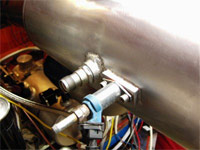CleanFUEL USA has announced U.S. EPA and California Air Resources Board (CARB) certification of the industry’s first and only propane engine system that is an OEM replacement technology for both new and aftermarket gasoline powered engines. Propane is a cost competitive, clean burning fuel alternative that is plentiful in the U.S. with the majority of worldwide propane produced and stored domestically. As a leading supplier of alternative fuel infrastructure, equipment and engine technology, CleanFUEL’s liquid propane fuel injection (LPI) system is designed to convert medium-duty fleets, such as school buses, shuttle buses and 4500-8500 series GM trucks, to operate on propane.
“We developed LPI technology to deliver improved fuel economy and competitive engine performance compared to gasoline and diesel powered vehicles, while significantly reducing greenhouse gas (GHG) emissions,” said Curtis Donaldson, CleanFUEL USA President and CEO. “With EPA/CARB approval of the LPI engine system, fleet managers nationwide can realize the transportation fuel benefits of propane using a technology that produces the lowest emissions for medium-duty vehicles on record.”
LPI is a drop and replace propane conversion system for 8.1L gasoline engines, offering fleet owners an affordable alternative fuel option over diesel or gasoline. The integrated engine system makes it easier for corporate and government fleets to benefit from the inherent fuel-economy, cost savings and environmental advantages of propane. With gasoline and diesel prices skyrocketing and the rising environmental concern, CleanFUEL provides the transportation industry the first CARB and EPA certified liquid propane fuel system with the potential to counterbalance steadily increasing petroleum fuel prices.
“Vehicles using propane can play a significant role in boosting California's transportation fuel diversity, adding fuel competition and reducing our dependence on gasoline and diesel,” commented James D. Boyd, vice chair of the California Energy Commission. “CleanFUEL USA is an innovative company, and I commend them for taking the lead without government support to independently advance the engine technology that offers an alternative fuel choice and reduces criteria and GHG emissions.”
Propane is in surplus worldwide with 90 percent of U.S. propane produced domestically when combined with supply from Canada. A national infrastructure of pipelines, processing facilities, and storage (i.e. 59 million barrel capacity in Texas alone) already exists for the efficient distribution of propane and there are roughly 3,200 propane dispensing stations across the U.S. Propane, also known as liquefied petroleum gas (LPG), is derived from 60 percent of natural gas processing, while 40 percent is a byproduct of crude oil refining. The U.S. currently imports approximately 73 percent of its petroleum demand – with the increased use of propane and other alternative fuels, the U.S. could displace a significant amount of that demand and introduce greater competition into the transportation fuel market.
Converting gasoline fleets to run on propane is a simple and cost-effective transition with CleanFUEL’s LPI engine systems, taking approximately a day and half to complete. The moderate cost of switching a vehicle’s engine to propane is easily offset by fuel cost savings. For example, a school district that transports 40,000 students each day, logging 8 million miles annually could save $1.9 million a year if the school operated half of its buses on propane instead of diesel. This calculation is based on the national price average for diesel at $4.52 per gallon according to a recent American Automobile Association report that also found the national average for regular gasoline at $3.79 per gallon. In comparison, propane motor fuel has been ranging between $2.39-2.59 per gallon nationally. Fleet owners using propane not only have a more cost competitive fuel option, but also qualifying fleets can take advantage of an additional $.50 federal tax credit per gallon of propane.

